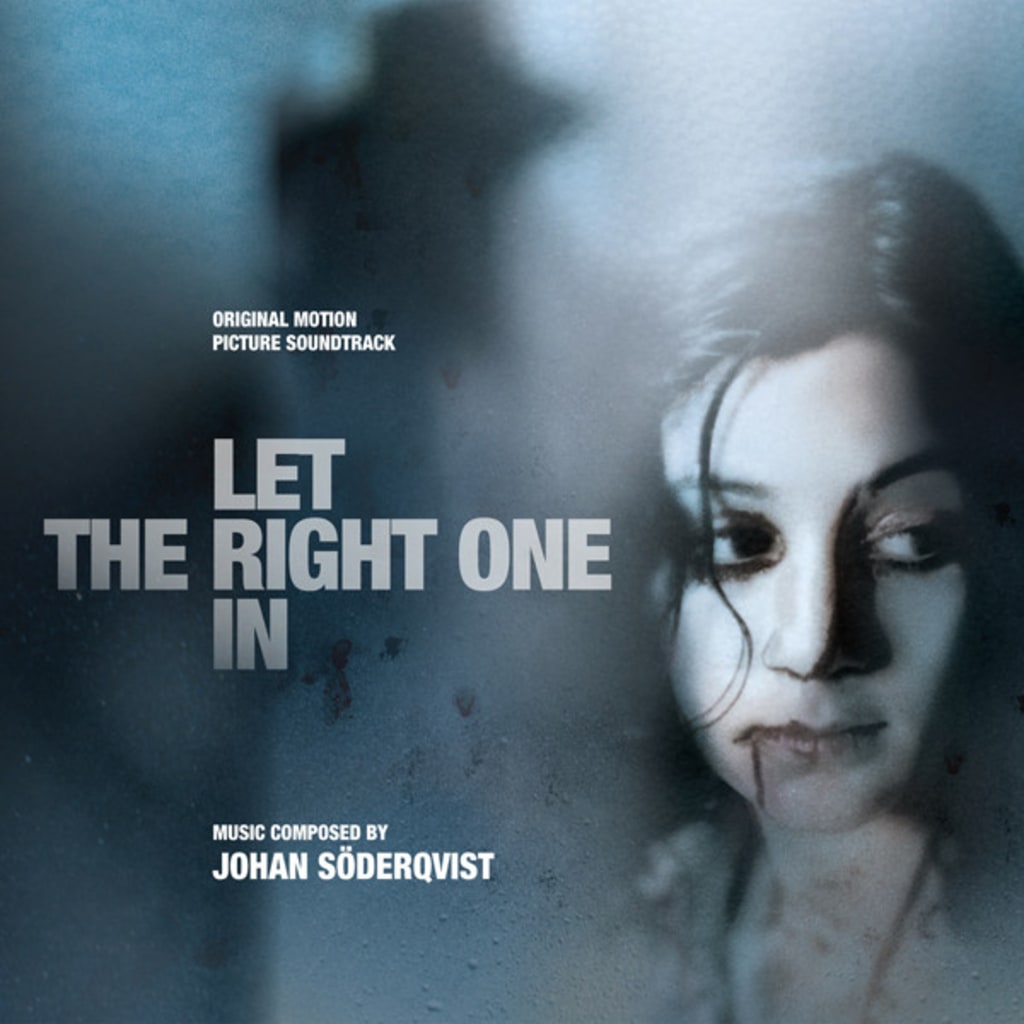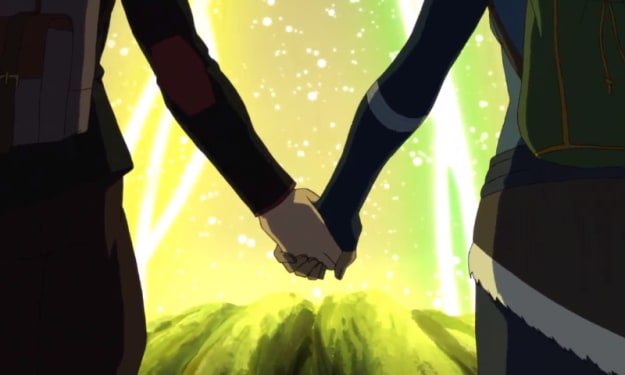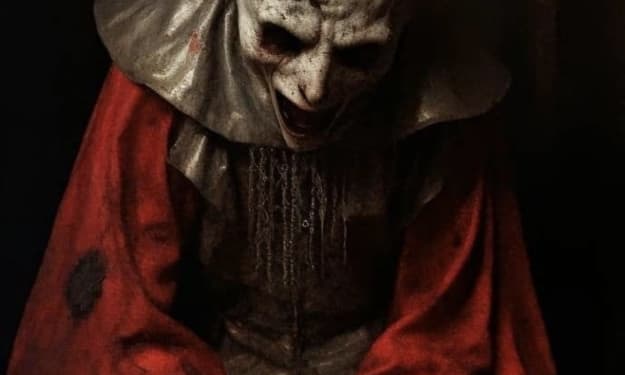What Stands Between: Let the Right One in Movie Review
A New Kind of Vampire Love Story

“Squeal pig, squeal.” This sentence is the sneered mocking of Oskar’s bullies, as well as the first line of dialog we hear from him within the film, as he stands outside, stabbing a tree and imagining taking revenge on his tormenters. This line is especially shocking, and telling, coming from the small boy. With pale skin, light blonde hair, and large eyes, Oskar would typically be what we as a viewer were shown as a shining example of uncorrupted innocence. Yet here, we see a child whose violent tendencies are taking him down a very dark and dangerous road.
How could such a thing happen? Well, the answer is as simple as it is sad. Oskar lives without any support or care. His school life is a constant state of humiliation and torment to the point that he’s been completely isolated from the rest of his peers. He has no friends and the only people who actively seek him out there are those coming to do harm. The teachers are no better. They never step in to protect him from the abuse, which means they are either too blind to see what he’s going through, or simply don’t care enough to get involved. Jordan Raup sums it up best in his review when he says, “The adults in this film, although close to the children, are inherently oblivious to the violence that is going on around them. The adults always have their faces turned away when any trouble arises. They have the ability to help, but don't because of their blindness.” (Para 8)
Oskar’s divorced parents are no better than his teachers. His mother is obviously distant, turning a blind eye to his suffering and accepting each and every paper thin excuse he makes for his injuries instead of trying to push to get answers, and while she does have a few moments of honest tenderness and care, they are the expectation, not the rule. His father, who he only visits for a few scenes, is active in interacting with his son as well as affectionate, but he’s more of a playmate then an actual parent. He’s also quick to forget about his son when his friend — who the film heavily implies is his new romantic partner — comes to visit, to the point that he doesn’t realize Oskar has packed up and left on his own until the following morning.
Oskar has been abused and abandoned by the world, and since being left to work his way through life —at least emotionally — on his own, he’s started to spiral downwards. He’s withdrawn into himself, and began to obsess on the violence and death, with his revenge fantasies and his crime journal, which is a notebook he’s keeping with newspaper clippings of all the violent crimes and murders. He’s headed nowhere good, and then, as Manohla Dargis puts it, “The bedraggled Eli drops into Oskar's life like a blessing, though initially she seems more like a curse.” (Para 4)
Eli is Oskar’s new neighbor, as well as a child vampire and therefore tiny serial killer. Now, it would be easy to assume that introducing someone who has to murder others to survive to the social cocktail of Oskar’s oncoming breakdown would make things even worse, and in some ways, I suppose it does, but in many more, this little, bloody, immortal arrived to save him.
Ed Howard writes on the subject, “Eli understand Oskar's feelings because like him she's an outcast, a freak, and like him she's seized by violent impulses, although in her case she doesn't have much of a choice.” (1) Eli is a creature of the night. An undead little girl who needs to drink the blood of the living to survive, and yet, despite this, she’s an extremely sympathetic character. This is because of how painfully lonely she is, and it’s this loneliness that opens the door for she and Oskar’s friendship- despite her early insistence that such a bond wasn’t possible and wouldn’t happen — which not only saves him but her as well.
From the moment the two connect over a shared toy, Oskar’s Rubix Cube, they become each other’s companions and comforters. From the moment the sun goes down, until late into the night the two children run and play throughout the town. Oskar takes Eli to secret places he’d learned of in his years living in the area, and Eli listens and comforts him when he speaks of his bullies, encouraging him to stand up to himself and fight back until the bullies dare not hurt him again, as well as promising to help him, should her plan fail. Together they ease each other’s loneliness and form a strong, as well as deeply innocent bond, which can make the viewer forget that one is a budding psychopath and the other is a blood sucker.
“This child-oriented perspective side-steps the overtly sexual implications of many vampire tales, both classic films and contemporary ones aimed at the teenage audience. Instead, the two young protagonists' progression from loneliness and alienation to friendship, mutual support, and empowerment functions as a gripping emotional journey with widespread appeal.” (Wright, 63)
When together, Eli and Oskar don’t support one another to go out more into the world, or to spread their wings. In fact, they probably do the opposite, pulling the other closer and building their own little sanctuary world of two, to the point that the only time we see someone else on screen with the both of them is when they have malicious intent. Yet, as Wright says, they’re still good for each other. They support and empower one another to survive the rough, lonely, and terribly unfair lives that they’ve been given, during the time that they’re apart.
As the film goes on, that time apart gets smaller and smaller. It starts to become sad and wrong to see just one. They seem to feel this as well, and take steps to lesson it all they can. A key example of this is when Oskar goes out of his way to learn mores code, and passes that knowledge to Eli, so that they can talk to each other through the conjoining wall of their rooms. In this scene, the film flips back and forth between the two throughout their conversation, and the shots seem to have been filmed deliberately to leave room for someone else. To emphasize the emptiness beside each character, and demonstrate how wrong and imbalanced it is for the two companions of the night to be separated.
Yet, despite this they have to be apart. Despite how much the two may want to vanish into their own world and lock everyone out, it’s not possible. At least, it’s not possible yet. Eli’s a vampire. A hunter and creature of the night, who can’t accompany Oskar through his daily life, and who has yet to admit her nature to him. Despite their bond, there’s still a separation between them, that goes beyond the physical. A wall that Eli keeps up to defend herself, so that she can play the part of a normal little girl. Then, later in the film, comes a scene that could be seen as spiritual continuation of their mores code, wall talks.
After going out and feeding, Eli returns to the apartments that they live in, but she doesn’t go home. Instead, she blatantly uses her vampire abilities to bypass the wall that kept them apart and, after getting Oskar’s permission, comes into his room through his window. Then, stripping out of her bloodstained clothes, she climbs into bed with Oskar. In this moment, we can see her wall going down as she lays bare and vulnerable behind him in bed, even willing to admit that "she flew," when asked how she got up to his window. It’s in this moment that she opens herself to not only admit to, but accept a new level of intimacy and relationship with Oskar, in a young and innocent version of going steady, that even Oskar admits is no different then what they were doing prior, except for the title. Then scene ends with Eli’s playful "fingers on the back" guessing game turning to her hand drifting down to hold Oskar’s, and while she’s gone by morning, with only a note quoting Romeo and Juliet left behind, it’s clear that something very important has changed.
In his review Jordan Raup says, “The title, (…) has multiple connections. Besides the apparent vampire meaning, by becoming friends with Eli, Oskar has 'let the right one in.' The idea that our destinies are determined by who we let into our lives is an overarching theme in this film.” (Para 5). Eli and Oskar are both people who have been let down, hurt, and abandoned by those around them. They are outcasts and freaks in the face of society, and one of the biggest decisions they have to make in the film is if they’re going to let the other in.
Eli has to decide if she’s going to trust Oskar, letting him past her wall and give him access to the dark truths of her existence and life, and in turn Oskar has to decide — both literally and emotionally — if he’s going to accept her for who and what she is, despite the risk and horror that comes with that, and if he’s going to let her in.
They do, but only after a childishly cruel test. After Eli’s come out about what she is, Oskar begins to pick at her. He takes her to his apartment, but doesn’t invite her in. Instead, he challenges her, asking her what would happen if she were to come inside without the permission. Eli takes his bait and steps through the door. Her body goes tense a second later, with blood coming from every orifice. In this moment, she’s putting her trust into Oskar. She’s putting her faith in the hope that her companion will accept her, and won’t let her suffering continue, and Oskar — now unable to hold onto doubt about Eli’s vampire status — doesn’t fail her. He steps forward, frightened not of her, but for her, and welcomes her in.
From that moment on, their bond is not something that can be questioned. They care and accept one another fully, and are willing to do whatever it takes to keep the other safe, even if doing requires something as extreme as killing. And, looking back on everything that has happened in the film, and to their characters, up until this point, should we as viewers really be surprised, or consider this a bad thing? The world turned its back on the two of them long before they found each other. Society hurt and rejected them, and they had both been left to suffer and eventually be consumed by their loneliness. Is it really bad or unreasonable that they’re willing to strike back at that world and society if that’s what it takes to keep the one person who has given them unconditional love and acceptance?
I, personally, don’t think the film believes so.
As the film nears its climax, the two kill a man who broke into Eli’s apartment with the intention of killing her, and the noise draws the attention of the neighbors. Though it clearly hurts her to do it, Eli gives Oskar a hug and kiss before leaving in a taxi to "somewhere far away." Yet, despite the obvious risks it presents, she isn’t actually able to leave him. Despite knowing that she’s bound to be found out, she goes back for Oskar, for her sole companion in the world, and arrives just in time to save him from his bullies who are intent on either holding him under the water until he drowns, or removing one of his eyes in punishment for his failure. This is because he fought back earlier in the film, hurting one of them to the point that he went deaf in one of his ears, and just as she promised she would if her advice failed, Eli steps in and kills all of them to save him.
When discussing the scene, Simon Bacon says, “In saving Oskar, Eli has, quite literally, ripped the bullies, and his old life, to pieces and so, to escape the retribution, we see them leaving Blackeburg on a train.” (30) The film doesn’t show the bullies’ demise, but from the kicking feet in the water, and the dismembered limbs littering the pool area, we can safely assume that Eli came back for Oskar in a fit of supernatural ability, with claws, fangs, unnatural strength, and rage like we’ve never seen in the film. The previous times Eli killed were followed by regret, but this time, as she looked at Oskar, she smiled. This is because, the previous murders had served as a reminder of what she was and how that isolated her, but this killing was also a rescue. She came charging in and was able to save the one person who loved and accepted her, and when Oskar smiled at her she knew she wouldn’t be losing someone. The two of them wouldn’t be alone again.
The film ends with Oskar in a train car, headed to some unknown location. After a moment, he leans forward and taps mores code for the Swedish word for "small kiss" onto a large crate on the car with him, and we realize that Eli is inside. In this moment, it’s so happy that it’s easy to forget about the gore of the scene prior.
Anne Billson puts it best when she says, “It's a classic happy ending in that we leave them in what is probably the optimum point in their story: young and in love with each other, and free. Each has saved the other's life, they trust each other completely and from now on they can be together. We're not supposed to think to hard about the trail of corpses they leave behind them.” (111)
We as viewer’s aren’t meant to feel bad about the death that came before this scene, or worry about the fact that Oskar is leaving everything and everyone in his old life behind, to go to some unknown place. Instead, we’re supposed to be happy, because our young couple are safe and able to stay together. This is because the film was never meant to be a typical vampire film, where the blood sucking beast must be stopped before she kills again. It’s the story of two children who were forsaken by society, and found happiness and acceptance with one another. There’s no harm in them leaving everything, and turning their back on everyone, because society had already abandoned them, and in rejecting it they found a home and belonging together. That’s why, despite all the death and violence, this story has a happy ending.
Sources
Låt Den Rätte Komma in Let the Right One in. Dir. Tomas Alfredson. By Tomas Alfredson, John Ajvide Lindqvist, Hoyte Van Hoytema, Johan Söderqvist, and Dino Jonsater. Prod. John Nordling and Carl Molinder. Perf. Kåre Hedebrant, Lina Leandersson, Per Ragnar, Peter Carlberg, Ika Nord, and Henrik Dahl. S.n., 2008.
Billson, Anne, "Let the Right One In: Devil’s Advocates." Leighton Buzzard: Auteur, 2011, Print.
Dargis, Manohla. "Pale Boy and Pale Vampire in a Still, Wintry Landscape." The New York Times. The New York Times, 23 Oct. 2008. Web. 27 Feb. 2016.
Howard, Ed. "Only the Cinema: Let the Right One In." Only the Cinema, 4 Mar. 2011. Web. 27 Feb. 2016.
Raup, Jordan. "The Captivating Loneliness of ‘Let The Right One In.’" The Film Stage. The Film Stage, 05 May 2009. Web. 27 Feb. 2016.
Wright, Rochelle. "The Rift Design of Politics: ‘Let the Right One In?'" The Public Sphere From Outside the West (n.d.): n. pag. University of Illinois. Web. 27 Feb. 2016.
About the Creator
Destiny Smith
Writing is one of the few constants I've had throughout my life, and Vocal seemed like the perfect opportunity to put it all somewhere.





Comments
There are no comments for this story
Be the first to respond and start the conversation.